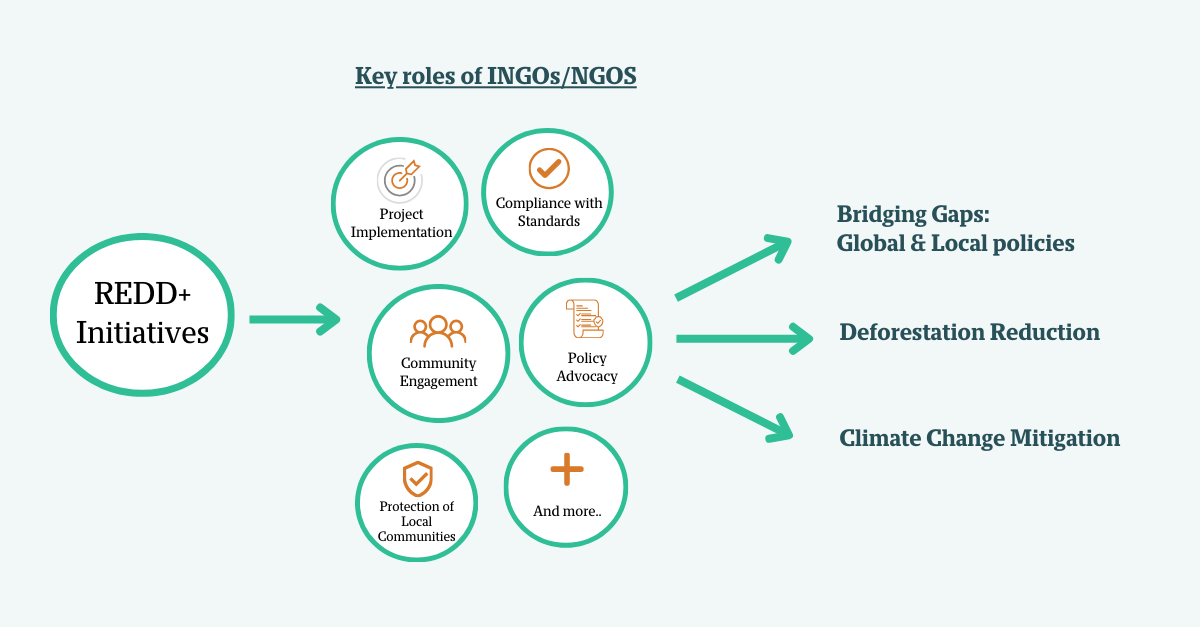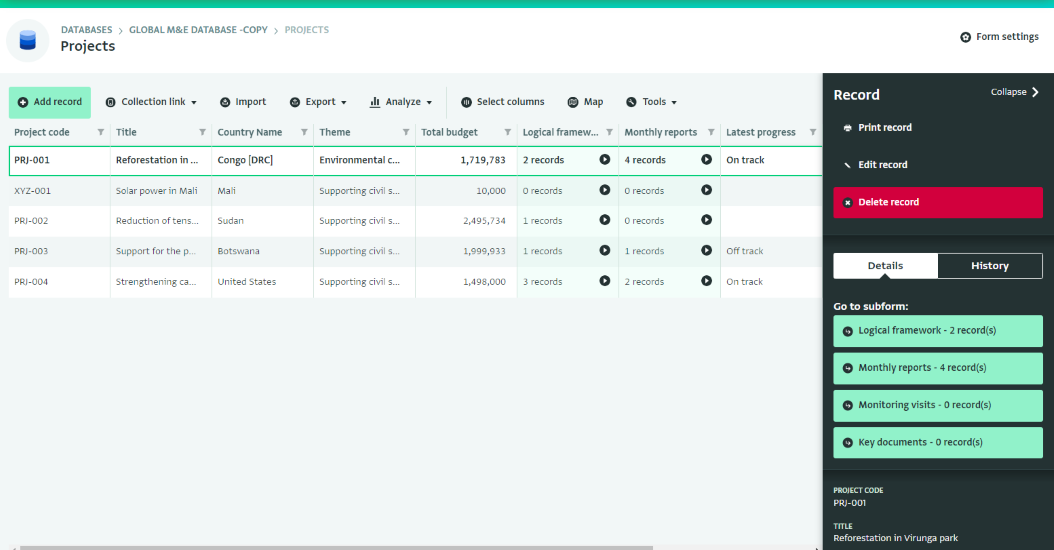How ActivityInfo improves REDD+ reporting and national forest monitoring with transparent, evidence-based data monitoring for carbon credit projects
The REDD+ framework stands for ‘Reducing emissions from deforestation and forest degradation in developing countries. The ‘+’ stands for additional forest-related activities that protect the climate (e.g. sustainable forest management, conservation and enhancement of forest carbon stocks, etc.). The UNFCCC provides the global policy framework and guidelines for REDD+ as part of its broader efforts to combat climate change.
With REDD+ activities, developing countries can receive results-based payments (carbon credit) for emission reductions when they reduce deforestation. Its main goal is to create financial value for the carbon stored in forests, offering incentives for developing countries to implement strategies to reduce emissions from deforestation and degradation, which are significant sources of global greenhouse gas emissions.
INGOs and NGOs play a crucial role in the implementation, promotion, and scaling of REDD+ initiatives. They implement and manage projects, ensure compliance with standards, advocate for supportive policies, engage and protect local communities and many more. Their work helps bridge the gap between global climate policy and local action, making them key players in the fight against deforestation and climate change.

To work on their projects such organizations use a variety of tools ranging from geospatial and remote sensing software to mobile data collection apps, reporting platforms and more. For example, geospatial data might be stored in one system, carbon stock calculations in another, and community engagement feedback in another. This fragmentation makes it difficult to have a unified view of the project so as to prove the additionality (benefits that wouldn't have happened without the activity) of their activities on carbon avoidance. It can also lead to inconsistencies and errors which can in turn harm the reputation of the organization or the REDD+ initiative itself.
ActivityInfo both as a platform and as a ‘partner’ has been offering solutions to similar problems for over a decade in the humanitarian and development sector. Today, the platform is also used to support evidence-based reporting and the monitoring of the impact of REDD+ projects and other environmental initiatives.
In this article, we explore how ActivityInfo can help address the information management challenges in this sector.

Improved data accuracy, integrity and verification
By having a centralized information management system, organizations can improve the accuracy of the data related to the carbon credit projects they are involved in. They can bring all relevant information such as forest cover data, carbon stock measurements, project activities, and community engagement records in one place and ensure that the data is consistent and up-to-date.
ActivityInfo offers tools that allow organizations to collect, validate and clean data so as to increase data quality and accuracy. An integrated mobile app, web-based data entry, validation rules, a duplicate scanner, a powerful importer and many more features ensure that data added to the system are consistent with project requirements and verification standards.
Also, thanks to audit logs and records history, you can maintain detailed audit trails of all submitted, edited and deleted data which can be useful for third-party verification or certification processes. In addition, it is also possible to design databases for carbon credit transactions and record keeping or other internal processes so as to ensure transparency and traceability.
Comprehensive overview of all aspects of the project
Because it is based on the relational database model, the platform allows you to link carbon data with other environmental and social indicators so as to get a more holistic view of your projects' impact. By creating relationships between different tables (e.g., linking carbon stock data with specific geographic locations or community feedback with project phases), your organization can have a consolidated view of all relevant information.
The relational data model also enforces data integrity by reducing redundancy. With references and key fields used to link related data across different tables you can ensure that each piece of information is stored only once and improve consistency.
Advanced reporting for enhanced transparency
Because all data related to carbon credit initiatives are in one centralized place and not trapped in data silos across various tools, analyzing it and compiling advanced reports becomes much easier in ActivityInfo.
Thanks to advanced data transformation tools such as calculated measures and calculated tables, colleagues can go a step further centralizing their data analysis and producing reports in the same system where the original data reside. This reduces the time and effort needed to compile reports manually but also increases transparency on how key calculations have been made. Because both calculations and original data is stored in the same system it becomes easier to demonstrate compliance and gain trust from buyers and regulators.
You can create standard reports which will be automatically updated as data comes in. Reports can then be shared with interested stakeholders in various formats including Dashboards, Notebooks, Charts, Maps and Pivot tables. Role-based access and advanced permission types ensure that users only have access to the data they need, maintaining security and data integrity.
If needed, ActivityInfo can be easily integrated with other software and support forecasting, advanced statistical analysis or spatial data analysis.
Real time data monitoring to reveal key issues in time
Because data is updated in real-time, it makes it easy for all relevant stakeholders to access the latest data related to carbon credit reporting. Real-time data monitoring can help NGOs identify and address potential issues—such as deforestation or degradation—before they become significant problems, ensuring that their carbon credit calculations remain valid and credible.
Suitable to scale, supporting large data volumes
As a REDD+ project scales up, the volume of data that you need to manage might grow exponentially. In this case, systems built on spreadsheets can quickly become cumbersome and create new challenges. ActivityInfo allows you to add thousands of records to your databases, allowing you to scale your system as your project grows.
Data security, privacy and compliance
Last but not least, data security and compliance with regulations (e.g., GDPR) is very important in carbon credit related projects, especially when dealing with sensitive information such as community data or financial transactions. ActivityInfo offers various features to help protect sensitive data so as to ensure compliance with legal and regulatory requirements. ActivityInfo also offers a Self-managed Server which allows you to get the platform’s capabilities on your own server or cloud account.
Would you like to see ActivityInfo in action? Never hesitate to contact us for a demo customized to your organization’s needs!